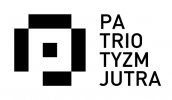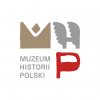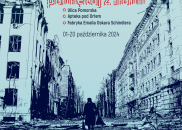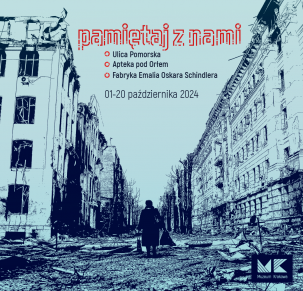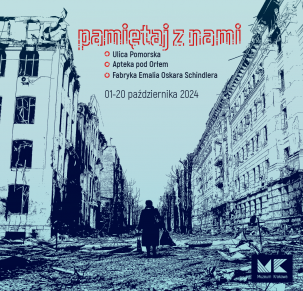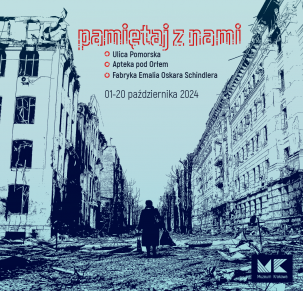11th-13th October: EAGLE PHARMACY
11.10.2024
- 13.10.2024
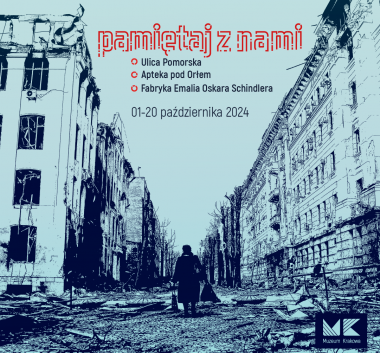
We invite you to explore the program for this year's edition of Pamiętaj z nami (Remember with us), a recurring event organized by the Museum of Krakow since 2012. Between 1st and 20th October 2024, events will take place at three branches of the Memory Trial: Pomorska Street, the Eagle Pharmacy, and Oskar Schindler’s Enamel Factory. The proposed activities will revolve around the central theme of war experiences of refugees from World War II and present-day conflicts, with a special focus on those fleeing Russia's aggression in Ukraine.
The theme will be approached from both an individual perspective and within a broader context, addressing the mechanisms connected to this issue. The chosen theme is deeply rooted in the heritage of the city and its residents, but it naturally extends beyond Krakow. The large influx of Ukrainian refugees since 2022 has posed challenges on many levels for the state and major urban centers during the early weeks of the war. The events will primarily reflect the experiences of Poles and Ukrainians, while also acknowledging political refugees from Belarus and the Middle East.
The project's goals include education, promoting empathy and human solidarity, integrating people from different cultures, as well as fostering memory and social engagement. The event’s audience includes Krakow residents of all ages, the Ukrainian minority in Krakow, international tourists visiting the Memory Trial branches, and residents of the Podgórze and Krowodrza districts where the Memory Trial locations are situated.
The program will feature historical workshops for youth, discussions, lectures, film screenings combined with meetings with Ukrainian creators, the unveiling of a mural created by Polish and Ukrainian artists, an outdoor exhibition at Ghetto Heroes Square, concerts in exhibition spaces, and the theatrical performance "Huljet, huljet" by Teatr Figur Kraków. There will also be meetings with war correspondents reporting on contemporary armed conflicts and representatives of non-governmental organizations helping refugees, guided exhibition tours and culinary workshops integrating Ukrainian, Belarusian and Middle Eastern cuisine. The grand finale will be a concert titled "Wołanie o pokój" (Cry for Peace) at Schindler’s Factory by the international choir, Jednym głosem, accompanied by poetry readings dedicated to wars and refugees, serving as a reflective tribute to the victims of war.
The theme will be approached from both an individual perspective and within a broader context, addressing the mechanisms connected to this issue. The chosen theme is deeply rooted in the heritage of the city and its residents, but it naturally extends beyond Krakow. The large influx of Ukrainian refugees since 2022 has posed challenges on many levels for the state and major urban centers during the early weeks of the war. The events will primarily reflect the experiences of Poles and Ukrainians, while also acknowledging political refugees from Belarus and the Middle East.
The project's goals include education, promoting empathy and human solidarity, integrating people from different cultures, as well as fostering memory and social engagement. The event’s audience includes Krakow residents of all ages, the Ukrainian minority in Krakow, international tourists visiting the Memory Trial branches, and residents of the Podgórze and Krowodrza districts where the Memory Trial locations are situated.
The program will feature historical workshops for youth, discussions, lectures, film screenings combined with meetings with Ukrainian creators, the unveiling of a mural created by Polish and Ukrainian artists, an outdoor exhibition at Ghetto Heroes Square, concerts in exhibition spaces, and the theatrical performance "Huljet, huljet" by Teatr Figur Kraków. There will also be meetings with war correspondents reporting on contemporary armed conflicts and representatives of non-governmental organizations helping refugees, guided exhibition tours and culinary workshops integrating Ukrainian, Belarusian and Middle Eastern cuisine. The grand finale will be a concert titled "Wołanie o pokój" (Cry for Peace) at Schindler’s Factory by the international choir, Jednym głosem, accompanied by poetry readings dedicated to wars and refugees, serving as a reflective tribute to the victims of war.
11th-13th October: EAGLE PHARMACY
11th October (Friday, 11:00 – 12:30)
Workshop "Dzieciństwo w getcie" (Childhood in the Ghetto)
The fate of children during World War II often evokes strong emotions. This is particularly evident when we realize that many children, aged 9-10, had to bear the responsibility of supporting their families in the ghetto. One could say they were forced to grow up overnight due to hunger, death and suffering.
The workshop aims to highlight the experiences of Jewish children during the Holocaust, encouraging students to reflect on their lives, daily struggles, dreams – and their deaths.
● Conducted by Jan Jakub Grabowski.
● Fee: 20 PLN
● Registration required at the Visitor center. Activity is available in Polish only.
11th October (Friday, 13:00 – 14:00)
Guided tour of the permanent exhibition "Tadeusz Pankiewicz's Pharmacy in Kraków Ghetto"
● Registration required and admission ticket needed.
● Activity is available in Polish and English.
11th October (Friday, 18:00 – 19:30)
Lecture "Przecież nie mogę ich narażać" (I can’t endanger them): escapees from the Krakow ghetto
When the German occupation authorities established the so-called "residential district" for Krakow's Jews in Podgórze in March 1941, few could have foreseen that this persecution would lead to the extermination of entire Jewish communities. Despite anti-Jewish regulations and daily violence, the ghetto residents did everything to survive, but only a few chose to escape beyond the ghetto walls. This lecture will tell the stories of those who managed to flee the ghetto, explaining the circumstances that led to their decisions, the methods of escape, and the lives of escapees on the so-called "Aryan side", as well as the attitudes of non-Jewish locals toward Jews trying to save their lives.
● Conducted by Katarzyna Kocik.
● Activity is available in Polish only.
12th October (Saturday, 12:00 – 15:00)
Educational walk with Andrzej Chytkowski following the path of victims deported from the Krakow ghetto to the Bełżec death camp (Ghetto Heroes Square – Kraków Płaszów Station), including a symbolic commemoration of Krakow’s Holocaust victims.
● Fee: 20 PLN
● Registration required at the Visitor center.
● Activity is available in Polish only.
12th October (Saturday, 18:00 – 19:30)
Evening with Kroke Gebirtig "Jak lokalnie dbać o pamięć o krakowskich ofiarach Zagłady?" (How to locally preserve the memory of Krakow's Holocaust victims?)
A meeting with Anna and Maria Jeziorny, who will talk about their work in the Mordechai Gebirtig Poetic Workshop. The event will conclude with students from Podgórze schools reading several poems by Mordechai Gebirtig, a Krakow poet who was murdered during the Holocaust.
● Activity is available in Polish only.
13th October (Sunday, 14:00 – 15:30)
Workshop "Jak spakować życie do walizki?" (How to pack your life into a suitcase?)
During this workshop, we will seek answers to the question: what is truly important when faced with conflict, natural disasters or life-threatening situations? Do we know how to act in such moments, and what should we prepare in advance? We will look at examples of deportations, expulsions and resettlements from both the past and present (Syria, Ukraine).
The workshop will include active group work, followed by a discussion on minimalism and whether it is better to "have more" or "be more".
● Conducted by Katarzyna Odrzywołek.
● Fee: 20 PLN
● Registration required at the Visitor center.
● Activity is available in Polish only.
13th October (Sunday, 16:00 – 17:30)
Workshop "Przerwane dzieciństwo" (Interrupted childhood)
This workshop will reflect on childhood experiences during World War II and contemporary conflicts. Participants will create three photo albums. The first will depict our own childhoods. For the second, we will travel back in time to the period of Krakow's occupation (1939-1945), examining the stories of Jewish children who lived in the Podgórze ghetto or were sent to KL Plaszow. The third album will reveal photographs and personal stories of children affected by modern conflicts in Ukraine, Syria and Somalia.
The workshop will conclude with a discussion on the importance of the fundamental values in the Declaration of the Rights of the Child and how we can contribute to defending the youngest victims. The goal is to raise moral awareness about the fate of children in conflict zones, marginalized communities, and those facing exclusion, and to understand that war, regardless of time or place, always brings the same tragic consequences.
● Conducted by Katarzyna Odrzywołek.
● Fee: 20 PLN
● Registration required at the Visitor center.
● Activity is available in Polish only.
13th October (Sunday, 18:00 – 20:45)
Performance "Huljet, huljet" by Teatr Figur Kraków, presented at the Tadeusz Pankiewicz’s Pharmacy as part of the Krakow Ghetto exhibition
"Huljet, huljet" is a poetic story about life in the Krakow ghetto. Inspired by photographs and diaries from the ghetto, the theatrical installation is performed as a shadow theater, with each story unfolding on a different "stage" — in old suitcases, medicine boxes, a child's crib and on a table.
The main inspiration for the performance came from several photos from the permanent exhibition at the Oskar Schindler’s Enamel Factory Museum: a lonely young child on an empty street, piles of broken furniture on Concord Square, an ice cream shop sign and a concert poster. What might the world have looked like through the eyes of a 4-year-old? What games did they play? What did they dream about?
● Registration required.
11th October (Friday, 11:00 – 12:30)
Workshop "Dzieciństwo w getcie" (Childhood in the Ghetto)
The fate of children during World War II often evokes strong emotions. This is particularly evident when we realize that many children, aged 9-10, had to bear the responsibility of supporting their families in the ghetto. One could say they were forced to grow up overnight due to hunger, death and suffering.
The workshop aims to highlight the experiences of Jewish children during the Holocaust, encouraging students to reflect on their lives, daily struggles, dreams – and their deaths.
● Conducted by Jan Jakub Grabowski.
● Fee: 20 PLN
● Registration required at the Visitor center. Activity is available in Polish only.
11th October (Friday, 13:00 – 14:00)
Guided tour of the permanent exhibition "Tadeusz Pankiewicz's Pharmacy in Kraków Ghetto"
● Registration required and admission ticket needed.
● Activity is available in Polish and English.
11th October (Friday, 18:00 – 19:30)
Lecture "Przecież nie mogę ich narażać" (I can’t endanger them): escapees from the Krakow ghetto
When the German occupation authorities established the so-called "residential district" for Krakow's Jews in Podgórze in March 1941, few could have foreseen that this persecution would lead to the extermination of entire Jewish communities. Despite anti-Jewish regulations and daily violence, the ghetto residents did everything to survive, but only a few chose to escape beyond the ghetto walls. This lecture will tell the stories of those who managed to flee the ghetto, explaining the circumstances that led to their decisions, the methods of escape, and the lives of escapees on the so-called "Aryan side", as well as the attitudes of non-Jewish locals toward Jews trying to save their lives.
● Conducted by Katarzyna Kocik.
● Activity is available in Polish only.
12th October (Saturday, 12:00 – 15:00)
Educational walk with Andrzej Chytkowski following the path of victims deported from the Krakow ghetto to the Bełżec death camp (Ghetto Heroes Square – Kraków Płaszów Station), including a symbolic commemoration of Krakow’s Holocaust victims.
● Fee: 20 PLN
● Registration required at the Visitor center.
● Activity is available in Polish only.
12th October (Saturday, 18:00 – 19:30)
Evening with Kroke Gebirtig "Jak lokalnie dbać o pamięć o krakowskich ofiarach Zagłady?" (How to locally preserve the memory of Krakow's Holocaust victims?)
A meeting with Anna and Maria Jeziorny, who will talk about their work in the Mordechai Gebirtig Poetic Workshop. The event will conclude with students from Podgórze schools reading several poems by Mordechai Gebirtig, a Krakow poet who was murdered during the Holocaust.
● Activity is available in Polish only.
13th October (Sunday, 14:00 – 15:30)
Workshop "Jak spakować życie do walizki?" (How to pack your life into a suitcase?)
During this workshop, we will seek answers to the question: what is truly important when faced with conflict, natural disasters or life-threatening situations? Do we know how to act in such moments, and what should we prepare in advance? We will look at examples of deportations, expulsions and resettlements from both the past and present (Syria, Ukraine).
The workshop will include active group work, followed by a discussion on minimalism and whether it is better to "have more" or "be more".
● Conducted by Katarzyna Odrzywołek.
● Fee: 20 PLN
● Registration required at the Visitor center.
● Activity is available in Polish only.
13th October (Sunday, 16:00 – 17:30)
Workshop "Przerwane dzieciństwo" (Interrupted childhood)
This workshop will reflect on childhood experiences during World War II and contemporary conflicts. Participants will create three photo albums. The first will depict our own childhoods. For the second, we will travel back in time to the period of Krakow's occupation (1939-1945), examining the stories of Jewish children who lived in the Podgórze ghetto or were sent to KL Plaszow. The third album will reveal photographs and personal stories of children affected by modern conflicts in Ukraine, Syria and Somalia.
The workshop will conclude with a discussion on the importance of the fundamental values in the Declaration of the Rights of the Child and how we can contribute to defending the youngest victims. The goal is to raise moral awareness about the fate of children in conflict zones, marginalized communities, and those facing exclusion, and to understand that war, regardless of time or place, always brings the same tragic consequences.
● Conducted by Katarzyna Odrzywołek.
● Fee: 20 PLN
● Registration required at the Visitor center.
● Activity is available in Polish only.
13th October (Sunday, 18:00 – 20:45)
Performance "Huljet, huljet" by Teatr Figur Kraków, presented at the Tadeusz Pankiewicz’s Pharmacy as part of the Krakow Ghetto exhibition
"Huljet, huljet" is a poetic story about life in the Krakow ghetto. Inspired by photographs and diaries from the ghetto, the theatrical installation is performed as a shadow theater, with each story unfolding on a different "stage" — in old suitcases, medicine boxes, a child's crib and on a table.
The main inspiration for the performance came from several photos from the permanent exhibition at the Oskar Schindler’s Enamel Factory Museum: a lonely young child on an empty street, piles of broken furniture on Concord Square, an ice cream shop sign and a concert poster. What might the world have looked like through the eyes of a 4-year-old? What games did they play? What did they dream about?
● Registration required.

